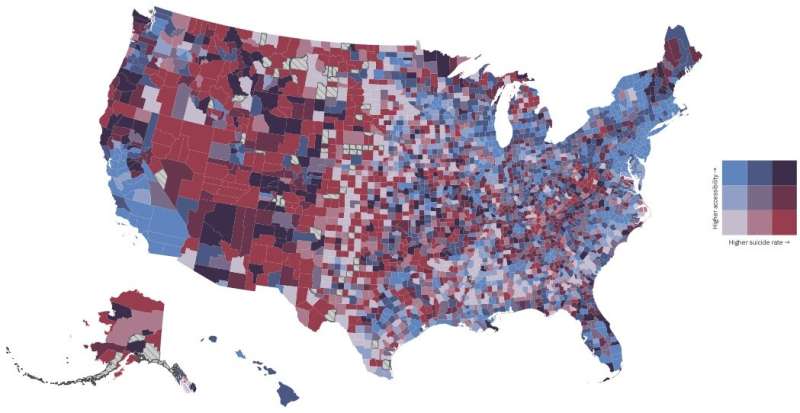This article has been reviewed according to Science X'seditorial processandpolicies.Editorshave highlighted the following attributes while ensuring the content's credibility:
fact-checked
peer-reviewed publication
trusted source
proofread
Study finds that improved access to mental health care is associated with reductions in suicide risk

Amid historically high suicide rates and mental health care provider shortages, new research from Incite at Columbia University suggests that interventions to alleviate mental health care access disparities can prevent unnecessary death and suffering. In an article pending publication inProceedings of the National Academy of Sciencesnext week, "Differential Spatial-Social Accessiblity to Mental Health Care and Suicide," Daniel Tadmon and Peter S. Bearman find that in the United States improved access to mental health care is associated with reductions in suicide risk.
To enable this research, Tadmon and Bearman developed new methods of measuring access with greater granularity than previously possible. To start, they precisely located all psychiatrists and therapists in the United States, creating a comprehensive, accurate provider mapping for the first time. For each census tract, roughly equivalent to a neighborhood in size, they calculated residents' access to care by incorporating service demand, competition, and transportation options.
Next, they compared this score to the average suicide rate at the county level. Higher scores, which indicated shorter travel times to more providers who are less saturated by demand, were strongly associated with reduced suicide risk. This effect persisted when controlling for other key factors associated with suicide, including race, divorce, and gun shop prevalence.
This work illuminates misalignments betweenhealthcare distribution and need in the United States. Tadmon notes that this data also exposes the high level of inequality in access to care. He adds, "It's alarming that the same people whosesocial circumstancesput them at greater risk forsuicidealso have a much harder time finding available psychiatrists and therapists who could help them."
For more information on the dataset underpinning this work, visit Incite'swebsite.
More information:Tadmon, Daniel et al, Differential spatial-social accessibility to mental health care and suicide,Proceedings of the National Academy of Sciences(2023).DOI: 10.1073/pnas.2301304120

















